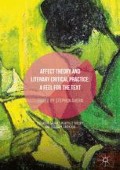Abstract
This chapter considers representations of speed in modern literature, or literature of the machine age, arguing that an affective craving for speed permeates thinking, feeling, expression, and subjectivity in modern and postmodern literature. Working forward from Thomas De Quincey to David Foster Wallace, including analyses of F.T. Marinetti, Evelyn Waugh, and Virginia Woolf, Sutherland argues that affect theory cannot be separated from motion and speed and further that narratives of speed open up texts to new critical possibilities. Drawing on Deleuze, Virilio, Massumi, Braidotti, Bennett, and others, Sutherland makes a case for ethical acceleration, wherein accelerated affective experience might be suspended momentarily for critical reflection on future subjectivities, provisionally matching critical understanding to the velocity of (post)modern, affective, embodied experiences.
Access this chapter
Tax calculation will be finalised at checkout
Purchases are for personal use only
References
Bennett, Jane. 2010. Vibrant Matter: A Political Ecology of Things. Durham: Duke University Press.
Braidotti, Rosi. 2011. Nomadic Theory: The Portable Rosi Braidotti. New York: Columbia University Press.
Burwick, Frederick. 2005. De Quincey and Animal Magnetism. The Wordsworth Circle 36 (1): 32–40.
———. 1995. Motion and Paralysis in ‘The English Mail-Coach’. The Wordsworth Circle 26 (2): 66–77.
Cichosz, Maria. 2013. The Potential of Paying Attention: Tripping and the Ethics of Affective Attentiveness. Emotion, Space and Society 10: 55–62.
Clej, Alina. 1995. A Genealogy of the Modern Self: Thomas De Quincey and the Intoxication of Writing. Stanford: Stanford University Press.
Clough, Patricia T. 2010. The Affective Turn: Political Economy, Biomedia, and Bodies. In The Affect Theory Reader, ed. Melissa Gregg and Gregory J. Seigworth, 206–225. Durham: Duke University Press.
Csikszentmihalyi, Mihaly. 1997. Finding Flow: The Psychology of Engagement with Everyday Life. New York: Basic Books.
Deleuze, Gilles, and Félix Guattari. 1987. A Thousand Plateaus: Capitalism and Schizophrenia. Trans. Brian Massumi. Minneapolis: University of Minnesota Press.
———. 1983. On the Line. Trans. John Johnson. Cambridge, MA: Semiotext(e).
De Landa, Manuel. 2014 [1997]. A Thousand Years of Non-linear History. New York: Swerve Editions.
De Quincey, Thomas. 1985 [1849]. Confessions of an English Opium Eater and Other Writing. Oxford: Oxford University Press.
Fay, Elizabeth. 2010. Hallucinogesis: Thomas De Quincey’s Mind Trips. Studies in Romanticism 49 (2): 293–312.
Flaherty, Michael G. 1987. Multiple Realities and the Experience of Duration. The Sociological Quarterly 28 (3): 313–326.
Ford, Natalie. 2007. Beyond Opium: De Quincey’s Range of Reveries. The Cambridge Quarterly 36 (3): 229–249.
Giles, Paul. 2007. Sentimental Posthumanism: David Foster Wallace. Twentieth-Century Literature 53 (3): 327–344.
Haraway, Donna J. 1991. Simians, Cyborgs and Women: The Reinvention of Nature. New York: Routledge.
Jarvis, Robin. 2004. The Glory of Motion: De Quincey, Travel, and Romanticism. Yearbook of English Studies 34: 74–79.
Kundera, Milan. 1997 [1995]. Slowness. Trans. Linda Asher. New York: Harper Perennial.
Maa, Gerald. 2011. Keeping Tome with the Mail-Coach: Anachronism and De Quincey’s ‘The English Mail-Coach’. Studies in Romanticism 50 (1): 125–217.
Massumi, Brian. 2002. Parables for the Virtual: Movement, Affect, Sensation, 30. Durham, NC: Duke University Press.
Max, D.T. 2013. Every Love Story Is a Ghost Story: A Life of David Foster Wallace. New York: Penguin Books.
Morrison, Robert, ed. 2013. Confessions of an English Opium Eater and Other Writings. Oxford: Oxford University Press.
Panzani, Ugo. 2015. ‘Mathematically Uncontrolled but Humanly Contained’: Narrative Iteration in Infinite Jest. Trans. Kim Williams. Lettera Matimatica 3 (4): 289–293.
Probyn, Elspeth. 2010. Writing Shame. In The Affect Theory Reader, ed. Melissa Gregg and Gregory J. Seigworth, 71–90. Durham: Duke University Press.
Stewart, Kathleen. 2010. Afterword: Worlding Refrains. In The Affect Theory Reader, ed. Melissa Gregg and Gregory J. Seigworth, 339–353. Durham: Duke University Press.
———. 2007. Ordinary Affects. Durham: Duke University Press.
Virilio, Paul. 1977. Speed and Politics. Trans. Mark Polizzotti. Rep. 1986. New York: Semiotexte.
Wallace, David Foster. 1997. Derivative Sport in Tornado Alley. In A Supposedly Fun Thing I’ll Never Do Again. New York: Black Bay Books.
Watkins, Megan. 2010. Desiring Recognition, Accommodating Affect. In The Affect Theory Reader, ed. Melissa Gregg and Gregory J. Seigworth, 269–285. Durham: Duke University Press.
Waugh, Evelyn. 1965 [1932]. Vile Bodies and Black Mischief. New York: Dell Publishing.
Wood, James. 2000. Human, All Too Inhuman. New Republic. 23 July. https://newrepublic.com/article/61361/human-inhuman.
Woolf, Virginia. 2015 [1932]. De Quincey’s Autobiography. In The Common Reader, Second Series. Adelaide: Ebooks@Adeliade. https://ebooks.adelaide.edu.au/w/woolf/virginia/.
———. 1977 [1931]. The Waves. London: Granada Publishing.
Author information
Authors and Affiliations
Editor information
Editors and Affiliations
Rights and permissions
Copyright information
© 2019 The Author(s)
About this chapter
Cite this chapter
Sutherland, K.G. (2019). Glad Animals: Speed, Affect, and Modern Literature. In: Ahern, S. (eds) Affect Theory and Literary Critical Practice. Palgrave Studies in Affect Theory and Literary Criticism. Palgrave Macmillan, Cham. https://doi.org/10.1007/978-3-319-97268-8_9
Download citation
DOI: https://doi.org/10.1007/978-3-319-97268-8_9
Published:
Publisher Name: Palgrave Macmillan, Cham
Print ISBN: 978-3-319-97267-1
Online ISBN: 978-3-319-97268-8
eBook Packages: Literature, Cultural and Media StudiesLiterature, Cultural and Media Studies (R0)

